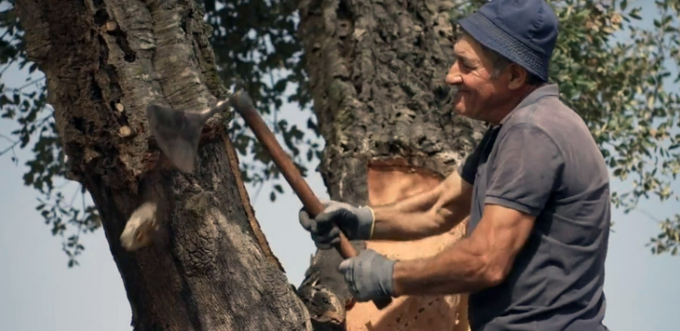November 27, 2025 | 22:03 GMT +7
November 27, 2025 | 22:03 GMT +7
Hotline: 0913.378.918
November 27, 2025 | 22:03 GMT +7
Hotline: 0913.378.918

A Portuguese farmer carefully strips cork from a tree.
One of the planet's most natural defenses against climate change and a key element in sustainable products is found in wine bottles around the world.
Scientists and engineers say cork has been used to make several products in everyday life, from flooring to insulation, and the process of harvesting it leaves a small carbon footprint.
In Portugal, farmers are only able to harvest bark by hand from the trees during a three-month window in the summer every nine years, and they use careful techniques to avoid wounding the trees.
"The tree tells us if we can take or not; you cannot force the cork to come apart," Conceição Santos Silva, a forest engineer, told ABC News last summer while the farmers were working on the trees.
The forests that produce cork themselves are also instrumental in lowering the carbon dioxide in the air, according to Silva. The Portuguese Cork Association estimates that the forests store about 14 million tons of CO₂ every year.
Cork trees can live for up to 200 years, harvested again and again over the decades, she said.
"Cork oak trees are a barrier to the desertification that comes from the south. This is the forest that is preventing the desert advance until Europe," Silva added. Desertification is when land can no longer support the same plant growth it had in the past, and the change is permanent, according to NASA's Earth Observatory.
When the cork is sent to a factory for processing, it is left to dry for up to nine months to remove TCA, which leaves a bad taste, according to engineers.
"You are looking at a factory that has been designed to make life hard for this micro-organism," Carlos de Jesus, a spokesman for Amorim, the world's largest cork manufacturer, told ABC News.
About 30% of the cork made at the Amorim plant is used for bottles, but de Jesus said that his plant does not waste any of the material.
"What does not go into a bottle top, can be made into aerospace and defense applications, can be made into footwear, flooring, heavy construction, [and] surfboards," he said.
The cork that’s of a lower quality is broken down into tiny bits, or granules, which are then assembled into sheets, and bound together by glue. That bonded cork is then used to make those materials, according to engineers.
Cork's chemical makeup makes it strong enough to withstand high temperatures, which is why it is used for insulation by many companies, including NASA.
Cork dust is swept up and turned into biofuel, which de Jesus said helps make the plant carbon-negative.
"Over 95% of the energy needed for this factory comes from cork dust," he said.
João Ferreira, the secretary-general of the Associação Portuguesa de Cortiça, a Portuguese cork business association, told ABC News that other countries and companies should look into cork-related solutions for their climate change issues.
"It’s a product that really answers to all the challenges we have as a society. You see the political programs from Europe to [the] US, everyone is trying to find products that are very positive in terms of sustainability. To face a new challenge in the circular economy so nothing is wasted. We can recycle, we can reuse, we can-zero waste. And so I see a bright future," he said.
(ABC)

(VAN) A new study reveals how the simultaneous effects of ocean acidification, salinity and loss of oxygen are making the world more fragile.

(VAN) Hopes are growing that the creation of the first 3D turkey gut model could be a turning point in the battle against the virulent blackhead disease.

(VAN) Tyson, America’s biggest meat supplier, plans to shutter one of its largest beef processing plants as the industry continues to struggle with low cattle supplies and political pressure from Washington.

(VAN) New FAO study shows how digital solutions are empowering farmers and fishers to prevent losses and build resilient agrifood systems.

(VAN) Brazil's COP30 presidency pushed through a compromise climate deal on Saturday that would boost finance for poor nations coping with global warming but that omitted any mention of the fossil fuels driving it.

(VAN) Poultry farmers in the UK have been warned that they could face one of the worst winters yet for bird flu.

(VAN) Prices of main-crop paddy have risen sharply, with jasmine rice hitting 16,100 baht per tonne — the highest level in years.